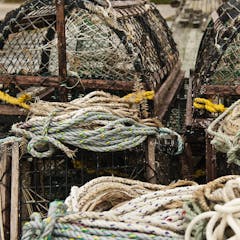
Articles on Bycatch
Displaying all articles

A new report has found the marine reserve covering the Heard and McDonald islands must urgently be expanded.

Hi-tech green LED lights attached to fishing gear can act as a deterrent to turtles and help reduce bycatch by approximately 40%.

The toll on wildlife from illegal fishing, bycatch and entanglement in fishing gear is likely underestimated, because it doesn’t account for ‘dark’ fishing vessels, a new study finds.

Wildebeest herds churning dust. Sturgeon seeking spawning grounds. Shorebirds flying from Siberia. These iconic animal migrations could soon be a memory.

To fish the oceans sustainably, nations must reduce bycatch, or accidental catches. But fishermen often resist changing gear or techniques that kill nontargeted species.

A study offers evidence that marine biology’s biggest stage is broken, and suggests ways to fix it.

A new study took a closer look at breeding pairs of these seabirds to find out why their bonds aren’t standing the test of time.

There is enormous potential to increase the productivity of African fisheries. There is also potential to improve coastal and marine health.

A collaborative approach with Scottish fishers has led to an app that shares data about the location of endangered species so that other fishing vessels can avoid them.

Tackling bycatch in large-scale fishing can make our seafood habit more sustainable

A high seas treaty could help rebuild populations – but time is running out.

There are no easy solutions when it comes to environmental concerns about the European fishing industry. Often solving an issue means replacing one problem with another.

Scientists were struggling to keep track of illegal fishing in international waters and the seabirds it threatened. Then they had an idea.

When it comes to small-scale fisheries, there is no one route to sustainability. Finding success stories can help map those paths.

Artisanal fishers in Sri Lanka are throwing away more marine species than they keep.

An expert reviews the research for and against the use of electric pulse trawlers.

Penguins in New Zealand, Australia and elsewhere face an uncertain future as a new review documents the number accidentally ensnared in fishing nets.

Are consumers being duped into thinking they are supporting a sustainable fishery?

New Zealand’s fisheries are considered among the best managed in the world, but this perception doesn’t match the facts.
